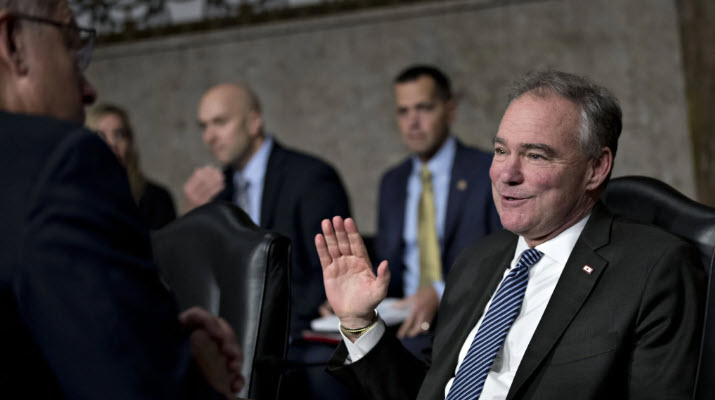With ‘robust’ waiver, Kaine says ‘Buy America’ requirements won’t hamstring Navy shipbuilding
July 28, 2023
Justin Katz
Breaking Defense
With ‘robust’ waiver, Kaine says ‘Buy America’ requirements won’t hamstring Navy shipbuilding
July 28, 2023
Justin Katz
Breaking Defense

Photo: Sen. Tim Kaine, D-Va., talks to Paul Francis, managing director of acquisition and sourcing management at the U.S. Government Accountability Office before a Senate Armed Forces Committee hearing. (Photographer: Andrew Harrer/Bloomberg via Getty Images)
By Justin Katz, Breaking Defense / July 28, 2023
A senior senator overseeing Navy shipbuilding said today that new “Buy America” requirements included in the upper chamber’s freshly passed defense policy bill should not overburden industry given the “broad” waiver available to the defense secretary.
“Had the [Tammy] Baldwin provision not had a really robust waiver, it wouldn’t have been a voice voted amendment added to the” defense policy bill, Sen. Tim Kaine, D-Va., told reporters, referring to an expedited form of voting the Senate uses for non-controversial issues. “I view that waiver provision as as quite broad… I think [it] provides the breadth that we need to advance the value of Buy America, but without hamstringing ourselves or needlessly increasing cost or delay.”
Kaine is the chairman of the Senate Armed Services seapower subcommittee, a key panel with jurisdiction both over the Navy’s shipbuilding budget as well as the policies that shape the service’s decision-making.
“Buy America” refers to certain federal laws that require some percentage of components used to build Navy ships are ultimately produced inside the United States. The new provisions, which were authored by Sen. Tammy Baldwin, D-Wisc., gradually ramp up the requirement over the next decade, culminating in 2033 when it reaches “100 percent.”
But the waiver Kaine referenced allows the defense secretary to bypass the requirements in a variety of situations, such as “to expand sourcing” to the United Kingdom, Australia, New Zealand, and Canada. That small group of countries is defined in law as “members of the national technical industrial base,” but notably leaves out some key nations with strong shipbuilding industries, such as South Korea.
The defense secretary can waive the requirement if the cost of the overall acquisition might be increased by “more than 25 percent,” the schedule would suffer “unreasonable delays” or if the measures needed to be in compliance are “inconsistent with the public interest.” A waiver can also be sought if the item is not manufactured by a domestic entity and initiating manufacturing would cause significant delays.
While lawmakers view the requirement as a way to boost jobs back home, the provision has historically generated heartburn for the Navy and industry, the former of which worries about how it could artificially raise a program’s cost if components can be more cheaply sourced abroad, while the latter must consider its own supply chains before offering bids on a given program.
Both Kaine and Baldwin have major shipbuilding constituencies at home. Kaine’s home state of Virginia houses HII, the Navy’s go-to contractor for aircraft carriers, while Baldwin’s Wisconsin is home to Fincantieri Marinette Marine, the prime contractor for the Navy’s new Constellation-class frigate.
“I am proud to champion Buy America policies because when we use taxpayer dollars, American companies and workers are the ones who should be benefiting,” Baldwin said in a statement to Breaking Defense about the amendment to the Fiscal Year 2024 National Defense Authorization Act, which passed the Senate late Thursday night with a vote of 86-11.
“By strengthening Buy America requirements for our shipbuilding industry, we are building more resilient domestic supply chains, growing our American economy, and maintaining a defense industrial base that is critical to our national security,” she continued.
In addition to potential strains on the Navy and industry, Ashley Townshend, a senior fellow for Indo-Pacific security at the Carnegie Endowment for International Peace, said the application of the laws have become a “politicized race to the bottom” and “go too far,” damaging US alliances all the while.
“This flies in the face of contemporary geostrategic realities. America is no longer an unrivaled technological and industrial superpower — it quite simply can’t beat some of its allies and partners when it comes to exquisite [research and development] and price competitiveness, particularly if it wants to compete with China,” he told Breaking Defense today.
“A more sensible balance needs to be found between the requirements of national resilience and the advantages of defense industrial integration with trusted allies and partners. Although it is good news that exemptions may be granted to Australia, Britain and Canada, the freezing out of other defense industrial partners like Japan, Korea and some European suppliers is strategically myopic,” he continued.
Latest News